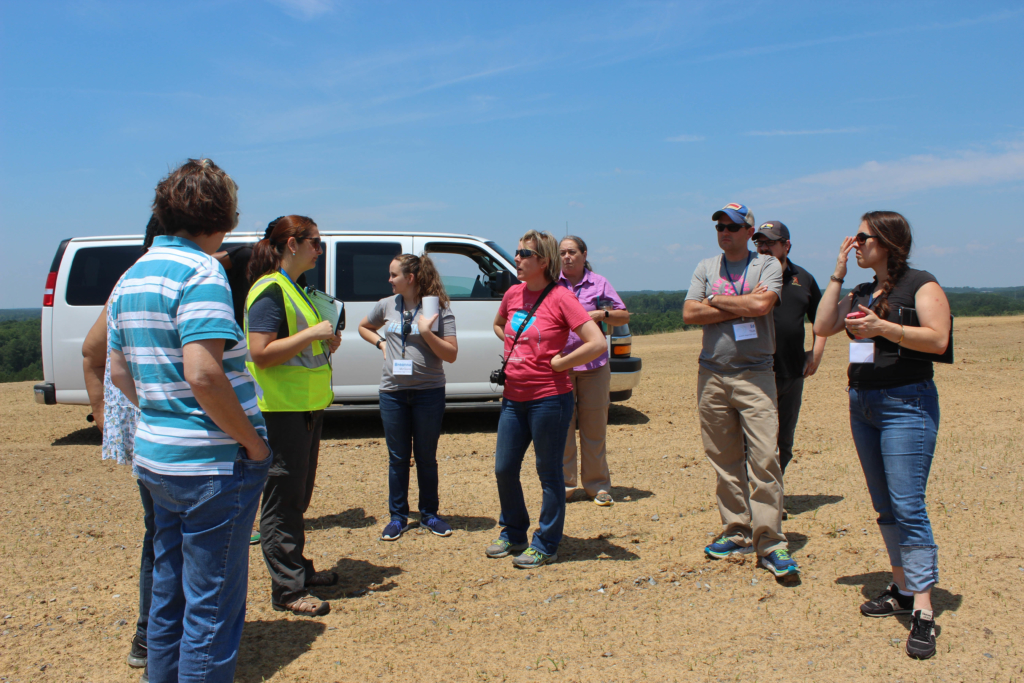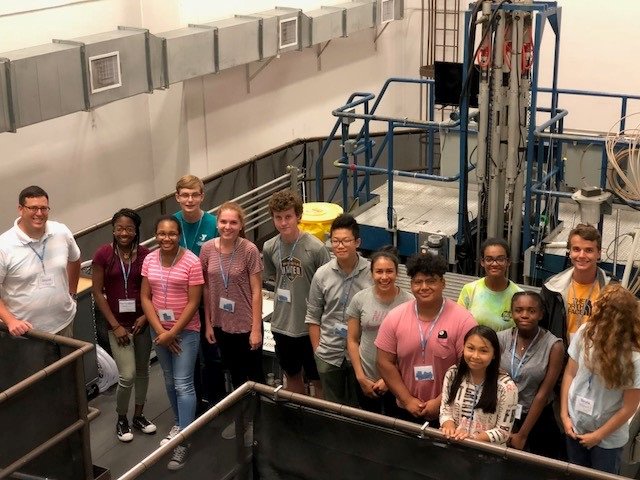IE continues to enhance energy literacy among NC students and teachers with grant from Duke Energy
December 1, 2018
Teachers stand on a completed landfill “cell” at South Wake Landfill. Yasmin Bendaas/EducationNC
In 2019, the Duke Energy Foundation will continue to support IE’s efforts to promote energy literacy among teachers and students in North Carolina, through a yearlong teacher professional development program and a yearlong science enrichment program for high school students. Led by the UNC Institute for the Environment’s Environmental Resource Program (ERP), teachers and students will receive hands-on, state-of-the-science exposure to current energy scholarship through the Energy Literacy Fellows program for 8-12th grade teachers and the Energy Literacy, Engagement and Action Program (Energy LEAP) for students.
“Investing in our state’s educational system is truly an investment in North Carolina’s future,” says Stephen De May, Duke Energy’s North Carolina president. “We’re proud to partner with the UNC Institute for the Environment to engage teachers and students in energy.”
These energy literacy programs take teachers and students on field trips to energy generation facilities and research labs and engage them with hands-on STEM activities. They also learn about careers related to the energy sector in the current and future job market.
“We see how relevant energy is in our society almost daily in the news,” says Dana Haine, the K-12 science education manager at the Institute, who leads the Energy Literacy Fellows Program. “With many teachers working from out of date textbooks, if they even have textbooks, our program provides teachers with updated information so that they can adequately teach about current energy issues and technologies with an emphasis on North Carolina.
The energy landscape has boomed in terms of new technologies and the prices for these new technologies have quickly dropped, Haine explains. For example, in North Carolina, solar power has seen rapid growth in recent years.
“What’s neat about the Energy Literacy Fellows program is that we give teachers a really good view of the energy landscape of North Carolina, which is where they live and teach,” Haine says. “We visit energy facilities across our state—from a wind farm, to a hog farm generating biogas, to a utility-scale solar farm. Recently we took Fellows to tour Duke Energy’s microgrid test facility in Mt Holly where the teachers got to see up close new technologies being evaluated.”
With the Energy Literacy Fellows program now entering its third year, Haine hopes to connect the cohorts through various activities and field trips to keep teachers engaged and promote their role as leaders in the field of energy education in NC. As program director, Haine will begin characterizing the impact the program is having on teachers long-term.
In addition, several Fellows will receive funding to attend IE’s 2019 UNC Clean Tech Summit, an event that highlights the latest innovations, trends and challenges in the clean technology industry and how North Carolina is playing a key role in leading the way to a green global economy. The Summit is co-hosted by the UNC Institute for the Environment and the Center for Sustainable Enterprise at UNC’s Kenan-Flagler Business School.
The Energy LEAP program, led by Grant Parkins, a watershed education coordinator at the Institute, brings 9th – 12th graders who attend any school in Alamance, Chatham, Durham or Orange counties to UNC-Chapel Hill for a weeklong energy science immersion.
“The Energy LEAP program provides students with a unique opportunity to learn about energy science in an engaging, hands-on way,” says Parkins. “They learn about the cutting-edge energy science research happening here at UNC while also seeing first-hand the innovative energy solutions that are being implemented right here in the Triangle. We work to engage their hands and their minds in hopes of inspiring them to become future leaders in science, technology, engineering and math.”
Learn more about the Energy Literacy Fellows.
Learn more about Energy LEAP.

